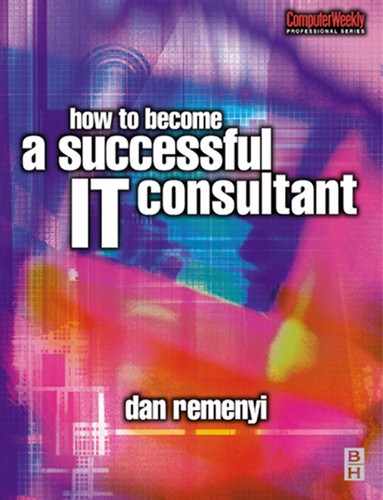Finding the next client |

The world that we have made as a result of the level of thinking we have done thus far creates problems that we cannot solve at the same levels as they were created.
Attributed to Albert Einstein by Pascale, R., Managing on the Edge,
Penguin Books, London, 1990, p. 11.
Every year hundreds or maybe thousands of IT professionals decide to give up their full-time permanent jobs and start their own IT consultancy. Many succeed in getting their consultancy business going by finding a few clients and doing some interesting and reasonably well-remunerated work. This will usually be exciting and fun. They will feel satisfied that they will have broken away from being a cog in the corporate world to doing their own thing. They may be working harder and longer hours but they will be doing this for themselves and that will bring with it a lot of satisfaction.
Getting to this point is a very useful start, but it is quite another matter to convert a few consulting jobs into what might be considered to be a sustainable IT consulting business. The former may not have been that difficult, but the latter is a major challenge. It is for this reason that not many attempts to set up an IT consultancy business survive. Most IT consultancy start-ups last no longer than a few years, after which their founder returns to a job in a large organization again or does something else.
Consultancy contracts are a transitory business. By their very nature most consultancy assignments have a limited duration. Some may only be days long, others weeks or maybe months. Very occasionally you might even find a consultancy job that will run for a year of two, but that is quite rare in the field of IT consultancy. If the organization has a big enough problem or a long-term problem they don't usually try to solve this situation by employing a consultant. It is more common for them to simply go out and recruit an individual to their staff.
The short-term nature of IT consultancy assignments presents a special problem, especially to those consultants who are working entirely on their own. This is to do with how you find the next job or the next client while being fully committed to giving your full attention to the current job. This is a problem for all consultancy firms, large and small, and there is no easy answer to the question. Some IT consultants ignore the problem of the next client until the current job is complete. In fact your daily rate should be adequate to give you enough money to take a short catch-up break between jobs during which you update yourself if you need to and find your next piece of work. However, this approach can sometimes lead to long periods between jobs, which can be very unpleasant especially if your resources are not too substantial.
Of course if you have a partner or you are in a strategic alliance with some organization then the problem of the next job might entirely go away or at least be significantly reduced. Your partner can be looking for the next job while you are fully occupied with the current one. Or your strategic ally can be lining up opportunities for you to follow up as soon as you have a free moment.
You can also employ a sales person. You may be lucky and find someone who is good and who is prepared to work mainly on commission. But this is rare. Sales people are intrinsically expensive and although they can be very helpful indeed, it is generally considered that in the field of IT consultancy, in the final analysis, new work can only be sold by the actual consultant. Although it is clear that this is not always true there is no doubt a substantial element of truth in this proposition.
Thus the finding of the next client is not a trivial exercise and if you want to work entirely on your own, you need to face this significant challenge square on.
Here are some suggestions that you might find helpful.
… A SET AMOUNT OF TIME FOR MARKETING EACH WEEK
It was mentioned in the Chapter 3 on Setting up your IT Consultancy business that in your planning you might consider putting aside a set amount of time for marketing each week. When you first start out if you are not able to line up a client to start work with as soon as you leave your old job, you will of course have been spending all your time marketing. You will have made many contacts, some of which will have shown some interest in you. You may actually have some work proposals still out with potential clients awaiting decisions. Decisions to employ consultants can take a long time and until a proposal has been formally refused or rejected you should always consider it as a potential next client. Remember, what is high on your agenda may not be high on your client's agenda. The task is, without annoying your client, to ensure that these potential suppliers of work do not lose interest in you or, worse, entirely forget about your existence. Thus one of the central issues is maintaining contact and making sure that you have some visibility in the market place.1
Visibility in the market place can come from several different sources. The following are the most important ones readily available to the start-up IT consultancy:
1 Making and maintaining personal contacts.
2 Joining a group such as the Computer Society, the Chamber of Commerce, etc.
3 Placing your name on a Web list
4 Speaking at conferences and seminars.
5 Writing for the press.
6 Writing a book.
7 Playing a role in the community.
9.1 Making and maintaining personal contact
There are numerous ways of keeping contact and the way you choose will depend upon how you made the contact to begin with and your style of running your business. You may have made a lot of contacts over the past few years and you may have to decide which of these are likely to be the best prospects for future work. Thus having prioritized your contacts you might just make regular phone calls, say once a month or once a quarter. You might just pay the prospect a visit to see if they still have a problem with which you could be of help. You might visit to update them on a new approach to an aspect of IT you have come up with. Each consultancy job that you do should be a learning experience for you. So towards the end of each job you should have something new to offer your prospective clients.
The main point here is to keep talking to your contacts and that you expand what you can offer them provided the new offering truly falls within your competencies.
You might develop a newsletter to send to your contacts or prospects. This might be a paper-based document or it might be produced electronically and despatched or circulated on the Internet. However, you need to be aware that there are a large number of newsletters circulating and that you will have to work quite hard to make yours sufficiently novel and interesting to read. Otherwise this will be a waste of effort.

… YOU MIGHT INVITE THEM TO LUNCH OR FOR AN OCCASIONAL DRINK AFTER WORK
If you are on friendly terms with your business prospects you might invite them to lunch or for an occasional drink after work.
9.2 Joining a group such as the Computer Society
Becoming a member of a society or a group such as the Computer Society or the Chamber of Commerce will give you visibility. These contacts are not likely to produce business in the short term but they can in the medium to longer term help you meet appropriate people and this can lead to business.
9.3 Placing your name on a Web list
There are a variety of Web lists of IT consultants on which you may place your name and which will produce some leads from time to time.
9.4 Speaking at conferences and seminars
As an IT consultant you may feel that you have some new leading edge concept that you wish to draw to the attention of your prospects and if this is the case you can organize an executive briefing or even a seminar. It is possible to do this on your own by hiring a room in a hotel or at a conference centre but it can also be effective to do this in conjunction with one of the IT professional societies or a Chamber of Commerce. There are also professional conference and seminar organizers to whom you could offer your services. You might even find it useful to obtain a small part-time role at a local college or university where you might meet mature students who could be looking for help with problems at work.

… BE REASONABLY CONFIDENT THAT YOU WILL OBTAIN THE RIGHT VISIBILITY …
Preparing to present a paper at a conference or deliver a seminar does take a considerable amount of work so you need to be reasonably confident that you will obtain the right visibility and perhaps a reasonable fee before embarking on this type of promotion venture.
If you are good at this then you could make presenting at conferences and seminars a specific line of business, which can be quite lucrative.
9.5 Writing for the press
Newspapers and magazines are in continual need of new stories or new angles on old ones. And another useful way of keeping your name visible is to write articles and have them published either in the general press or in some specialized newspaper or magazine. If you can arrange to have your ideas published in a suitable newspaper then you can sometimes receive a considerable amount of interest and attention. However, this will not happen with every newspaper and sometimes this type of writing can become more effort than it is worth.2
The idea of writing for visibility may be extended to the Internet where, as mentioned above, an increasing number of IT consultants have their own newsletter. Sometimes these Internet newsletters are complemented with or by a discussion group which is also a useful tool for ensuring a degree of visibility. The Internet and the Web are indeed powerful ways of keeping in touch and ensuring your visibility but they suffer from the major drawback that you can attract a considerable amount of attention from individuals and organizations who can consume much of your time and have no intention or no ability to offer you any paid work. It is hard to assess who could be of importance to your business through Internet or Web contact so just be careful that you don't spend too much time on this activity.
9.6 Writing a book

WRITING A BOOK IS NOT, FOR MOST IT CONSULTANTS, A SHORT PROJECT …
Although this is no easy matter, if you have something interesting to say writing a book can be useful to the IT consultant and can resulted in a considerable amount of business. Writing a book is not, for most IT consultants, a short project and if done on a part-time basis can take many months or even years to complete. Do not begin writing your book until you have a plan as to how it will be published, even if it is only that you will publish it yourself. There is no great problem in having one hundred copies printed and you could use these as a way of catching the attention of prospects.
Writing a book can result in obtaining very interesting work. But do bear in mind that not every book written by a consultant has led to work. In my case only one of my several books actually resulted in consultancy, but it has produced a number of very important jobs for me over the years.
9.7 Playing a role in the community
An IT consultant can make him or herself visible by offering to help out at the local school or through the parish council or through the local boy scouts or girl guides associations. IT know-how is always in short supply and by making yourself useful your name will get around. Joining your local Rotary or Round Table club is another way of gaining exposure. It is probably a good idea first to check out who the other members of these groups are to see if there might be some useful contact there.
There are two more important ways that an IT consultant can set about finding the next client while still relatively busy with the current assignment:
1 Looking for more work with an existing client.
2 Have your client recommend you to suppliers and/or clients.
9.8 Looking for more work with an existing client
Existing clients are often an excellent source of new business. You should be close to your clients and you should know not only what their current needs are but also what their future needs are likely to be. Furthermore you should also know how best to sell to them.
You may be able to sell on from your current project to the next phase in that work or you may be able to sell an entirely different type of job.
If you can expand the job you are doing to cover a wider field then you may be able to generate sufficient work for you to be able to recruit another member of staff. Of course this work would have to be sustainable for a while to justify employing an extra pair of hands.
9.9 Have your client recommend you to suppliers and/or clients
While working with your existing client you will invariably meet some of their suppliers and/or clients as well as perhaps other consultants. All these people may be regarded as potential clients for you or at least good prospects for your own network.
In some cases it may even be appropriate for your current client to recommend you to one of their customers or suppliers especially if you have been working on a system that involves interfacing with your clients’ customers or suppliers. If such an opportunity exists it's important not to miss it.
As mentioned above it is not a trivial matter to find your next client. If it were, IT consulting would be a cinch and it's not. You always have to be on the lookout for business and this can be a very tiring process. However, over time as you become more established business begins to come to you. However, even in the most established IT consulting groups this can never be taken for granted.
9.10 Remember what the Internet can do for you
As a global directory the Internet allows the world to have access to the information that you decide to post on your website. Thus at the end of each job you need to update your CV by adding to the list of your work experience. If your last client will allow you to mention their name this can be helpful especially if they are a well-known organization. Then e-mail all your relevant prospects with this update on your service range. The Internet is also available to you to look for clients and you can find out much from a website about a prospect before you make any formal approach. This is invaluable in helping you refine what your offering is going to be.

THE INTERNET IS ALSO AVAILABLE TO YOU TO LOOK FOR CLIENTS …
9.11 Final note
The problem of finding the next client never goes away. Even long-standing, well-established consultants often find themselves wondering where the next job will come from. It is in the very nature of the consulting business and if you find this too distressful then IT consulting may not be for you. On the other hand this uncertainty is one of the things that makes working as a consultant challenging, exciting, sometimes miserable but never ever dull or boring.
9.12 Summary and conclusion
The three most important issues in running your own IT consultancy are marketing, marketing and marketing. Of course this does presume that you are basically competent and that you have skills that the market wants. After your basic competence and your marketable skills in IT then the overriding issue for a sustainable business is your ability to market yourself. This chapter provided some suggestions as to how you might be able to market yourself on an ongoing basis.
If you are going to succeed you will always have to keep the marketing issue at the forefront of your mind.
9.13 Checklist
Things to think about when working on finding the next client
1 Do you have any assignment proposals that are still in front of potential clients?
2 Have you acquired new skills from your current assignment that you would be able to offer to new prospective clients?
3 If your assignment proposal is older than three months contact the potential client and see if they are interested to have a revised proposal.
4 Have you prioritized your list of business contacts by whom is most likely to offer you an assignment?
5 Phone the three most probable potential clients and seek an appointment to discuss what you can do for them.
6 Have you attempted to sell on to your current client directly or to some other part of that organization?
7 Will your client allow you to write up your work as a case study and have it published in a professional journal or industry newspaper?
8 Have you made any interesting contacts with your current clients’ suppliers or customers that you could follow up?
9 Do you have an arrangement with a local newspaper or journal to write occasional articles for them?
10 Have you discussed delivering or contributing to a seminar with your Chamber of Commerce or some other professional training provider?
1 This point is to some extent controversial. Some business consultancy firms have rules for their sales staff which require them to close a deal with a potential client within, say, three months of any contact with them. If the sales person does not make a sale within this period the management of the business consultancy firm will insist that the sales person drops the potential client from their list and does not spend any more time trying to sell to them. This is probably too harsh an approach to filtering out low potential sales prospects for the newly started-up IT consultancy.
2 Some newspapers sometimes have trouble in filling all their pages, i.e. they have unused space which is called white space. When this occurs they look around for articles that they can use. It can be helpful if you can make contact with such a newspaper and agree that they will publish articles for you. However, if you do not get some enquiries as a result of this press exposure then you may not want to persevere with it as it does take time to write these articles.


